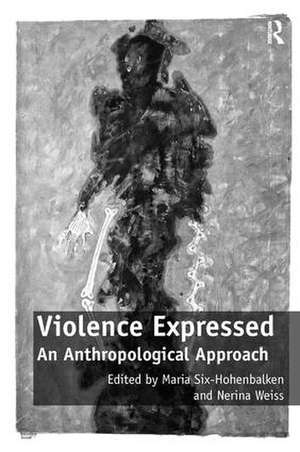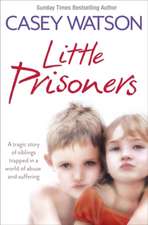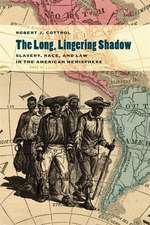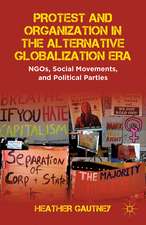Violence Expressed: An Anthropological Approach
Editat de Maria Six-Hohenbalken, Nerina Weissen Limba Engleză Hardback – 16 feb 2011
| Toate formatele și edițiile | Preț | Express |
|---|---|---|
| Paperback (1) | 427.16 lei 43-57 zile | |
| Taylor & Francis – 11 noi 2016 | 427.16 lei 43-57 zile | |
| Hardback (1) | 1112.34 lei 43-57 zile | |
| Taylor & Francis – 16 feb 2011 | 1112.34 lei 43-57 zile |
Preț: 1112.34 lei
Preț vechi: 1356.52 lei
-18% Nou
Puncte Express: 1669
Preț estimativ în valută:
212.84€ • 222.82$ • 176.12£
212.84€ • 222.82$ • 176.12£
Carte tipărită la comandă
Livrare economică 07-21 aprilie
Preluare comenzi: 021 569.72.76
Specificații
ISBN-13: 9780754678847
ISBN-10: 0754678849
Pagini: 264
Dimensiuni: 156 x 234 x 22 mm
Greutate: 0.54 kg
Ediția:1
Editura: Taylor & Francis
Colecția Routledge
Locul publicării:Oxford, United Kingdom
ISBN-10: 0754678849
Pagini: 264
Dimensiuni: 156 x 234 x 22 mm
Greutate: 0.54 kg
Ediția:1
Editura: Taylor & Francis
Colecția Routledge
Locul publicării:Oxford, United Kingdom
Cuprins
Contents: Introduction, Nerina Weiss and Maria Six-Hohenbalken; Part I Normalization and Aesthetics: The utter normalization of violence: silence, memory and impunity among the Yup'ik people of southwestern Alaska, Linda Green; Warriors of honour, warriors of faith: two historical male role models from south-western Arabia, Andre Gingrich; Public events and the Japanese self-defense forces: aesthetics, ritual density and the normalization of military violence, Eyal Ben-Ari; Aesthetics of martyrdom: the celebration of violent death among the Liberation Tigers of Tamil Eelam, Øivind Fugelrud. Part II Discursive Strategies - Muted Language: When soldiers explain: discursive strategies used by Israeli conscripts when recounting their experiences in the field, Erella Grassiani; Tense relations: dealing with narratives of violence in eastern Turkey, Nerina Weiss; Speaking blood: metaphoric expressions of sexual violence in a Guadeloupian family, Janine Klungel; Expressed, muted and silenced: Mestizo childhood and everyday violence in a marginal neighbourhood in Quito, Ecuador, Esben Leifsen. Part III Remembering and Aftermath: Silence, denial and confession about state terror by the Argentine military, Antonius C.G.M. Robben; From traumatic history to embodied memory: a methodological challenge to anthropologists, Adelheid Pichler; 'All filmmaking is a form of therapy': visualising memories of war violence in the animation film Waltz with Bashir (2008), Michaela Schäuble; Blurred boundaries in World War I: strategies of censorship, denial and the role of witness accounts, Maria Six-Hohenbalken; Index.
Notă biografică
Maria Six-Hohenbalken is a researcher at the Research Unit for Social Anthropology at the Center for Asian Studies and Social Anthropology, Austrian Academy of Sciences Nerina Weiss is a research fellow in the Department of Social Anthropology at the University of Oslo, Norway
Recenzii
'Violence Expressed brings together cutting edge work on violence from an impressive array of anthropologists. This wonderful book builds on existing anthropological literature by offering new methodologies for the study of violence and cutting a path for theoretical approaches that push beyond silence to understanding.' Victoria Sanford, Lehman College, City University of New York, USA 'Brilliant: a truly global tour de force on the complex life of violence - the wars of the 4th generation - by the field’s leading anthropologists. Compelling, comprehensive, illuminating. In exploring the deep ways violence is expressed, sensed, and lived, these authors offer the best of contemporary anthropological ethnography and theory.' Carolyn Nordstrom, University of Berkeley, USA 'The editors of Violence Expressed have presented an elegant volume focusing on the means by which violence is normalized, voiced and muted by perpetrators, victims, bystanders and researchers. In a remarkably coherent and complementary collection, the contributions all wrestle with the contention by leading researchers Appadurai (1996) and Das (2007) that language is limited in grappling with the horrors of violence... excellent and informative... powerful and poetic... a deeply contextualized and insightful study... Sociologists should not be put off by the subtitle of this collection referring to our sister discipline.... the wide variety of examples from around the world provide much to ponder in addition to our homegrown villains typically defined in terms of race, class and gender.' Contemporary Sociology 'The diverse ethnographic content in Violence Expressed is united by two useful approaches: the first is the idea that violence relies on silence to make it normative; the second is the exploration of concepts like silence through their historical and cultural setting rather than through their homology with Western discourse. The book could have followed the well-worn path of
Descriere
Violence Expressed explores the diverse expressions and manifestations through which the meaning of violent experiences and events are (re)produced. A compelling contribution to ongoing discussions on anthropological writing, this book will be of interest to anthropologists and social scientists working on violence, gender, collective representations and memory.









